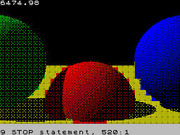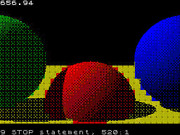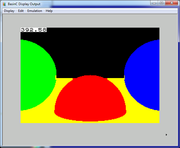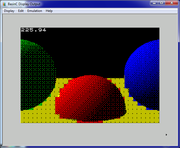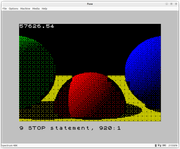Code: Select all
2 origin flip: PAPER 0: INK 7: CLS : let TME=MSECS: LET SW=SCRW/2: LET SH=SCRH/2: GO SUB 8000: GO SUB 7000: DIM C(64): DIM L(64): LET DZ=(ScrW/800)*2: FOR X=0 TO scrw-1 STEP 8: FOR Y=0 TO scrh-1 STEP 8
40 LET DX=(X-SW)/256: LET DY=(Y-SH)/256: GO SUB 1000: LET CTL=PC: LET LTL=PL: LET DX=(X-SW+7)/256: GO SUB 1000: LET CTR=PC: LET LTR=PL: LET DY=(Y-SH+7)/256: GO SUB 1000: LET CBR=PC: LET LBR=PL: LET DX=(X-SW)/256: GO SUB 1000: LET CBL=PC: LET LBL=PL
51 IF CTL=0 AND CTR=0 AND CBR=0 AND CBL=0 THEN GO TO 500
111 LET CI=1: DIM A(8): LET PL=0: FOR U=X TO X+7: LET DX=(U-SW)/256: FOR V=Y TO Y+7: IF CI=1 THEN LET PC=CTL: LET PL=LTL: GO TO 160
141 IF CI=8 THEN LET PC=CBL: LET PL=LBL: GO TO 160
142 IF CI=57 THEN LET PC=CTR: LET PL=LTR: GO TO 160
143 IF CI=64 THEN LET PC=CBR: LET PL=LBR: GO TO 160
150 LET DY=(V-SH)/256: GO SUB 1000
160 LET A(PC+1)=A(PC+1)+1: LET C(CI)=PC: LET L(CI)=PL: LET CI=CI+1: NEXT V: NEXT U: LET MFC=0: FOR C=2 TO 8: IF A(C)>MFC THEN LET MFC=A(C): LET MFI=C
204 NEXT C: LET FC=MFI-1: INK FC
301 LET CI=1: FOR U=X TO X+7: FOR V=Y TO Y+7: IF C(CI)>0 AND H(CI)<=L(CI) THEN PLOT U,V
325 LET CI=CI+1: NEXT V: NEXT U
500 NEXT Y: GO SUB 3000: PRINT AT 0,0; INK 7;(msecs-TME)/1000: NEXT X: STOP
1000 LET MT=1E10: LET A=2*(DX*DX+DY*DY+DZ*DZ): FOR S=1 TO NS: LET B=2*(DX*S(S,1)+DY*S(S,2)+DZ*S(S,3)): LET C=(S(S,1)*S(S,1)+S(S,2)*S(S,2)+S(S,3)*S(S,3))-S(S,4): LET D=B*B-2*A*C: IF D<0 THEN GO TO 1500
1231 LET D=SQR (D): LET T=(B+D)/A: IF T>0 AND T<MT THEN LET PC=S(S,5): LET MT=T: LET CS=S
1250 LET T=(B-D)/A: IF T>0 AND T<MT THEN LET PC=S(S,5): LET MT=T: LET CS=S
1500 NEXT S: IF MT=1E10 THEN LET PC=0: RETURN
1600 LET IX=DX*MT: LET IY=DY*MT: LET IZ=DZ*MT: LET NX=IX-S(CS,1): LET NY=IY-S(CS,2): LET NZ=IZ-S(CS,3): LET PL=AI: GO SUB 2100: IF H=1 THEN RETURN
1615 LET NL=(NX*LX+NY*LY+NZ*LZ): IF NL>0 THEN LET PL=PL+DI*NL/SQR (NX*NX+NY*NY+NZ*NZ)
2000 RETURN
2100 LET A=2*(LX*LX+LY*LY+LZ*LZ): FOR S=1 TO NS: LET CX=IX-S(S,1): LET CY=IY-S(S,2): LET CZ=IZ-S(S,3): LET B=-2*(CX*LX+CY*LY+CZ*LZ): LET C=(CX*CX+CY*CY+CZ*CZ)-S(S,4): LET D=B*B-2*A*C: IF D<0 THEN GO TO 2210
2160 LET D=SQR (D): LET T=(B+D)/A: IF T>0.01 THEN LET H=1: RETURN
2190 LET T=(B-D)/A: IF T>0.01 THEN LET H=1: RETURN
2210 NEXT S: LET H=0: RETURN
3000 RETURN
7000 DIM H(64): RESTORE 7100: FOR I=1 TO 64: READ H(I): LET H(I)=H(I)/64: NEXT I: RETURN
7100 DATA 0,32,8,40,2,34,10,42
7101 DATA 48,16,56,24,50,18,58,26
7102 DATA 12,44,4,36,14,46,6,38
7103 DATA 60,28,52,20,62,30,54,22
7104 DATA 3,35,11,43,1,33,9,41
7105 DATA 51,19,59,27,49,17,57,25
7106 DATA 15,47,7,39,13,45,5,37
7107 DATA 63,31,55,23,61,29,53,21
8000 LET LX=-1/SQR (2): LET LY=1/SQR (2): LET LZ=0: LET AI=0.075: LET DI=1-AI: RESTORE 9000: READ NS: DIM S(NS,5): FOR S=1 TO NS: FOR I=1 TO 5: READ S(S,I): NEXT I: NEXT S: RETURN
9000 DATA 4
9001 DATA 0,-1,4,1,2
9002 DATA 2,0,4,1,1
9003 DATA -2,0,4,1,4
9004 DATA 0,-5001,0,5000^2,6
It's been updated for varying resolutions, and added ORIGIN FLIP to get the graphics upside-down.
